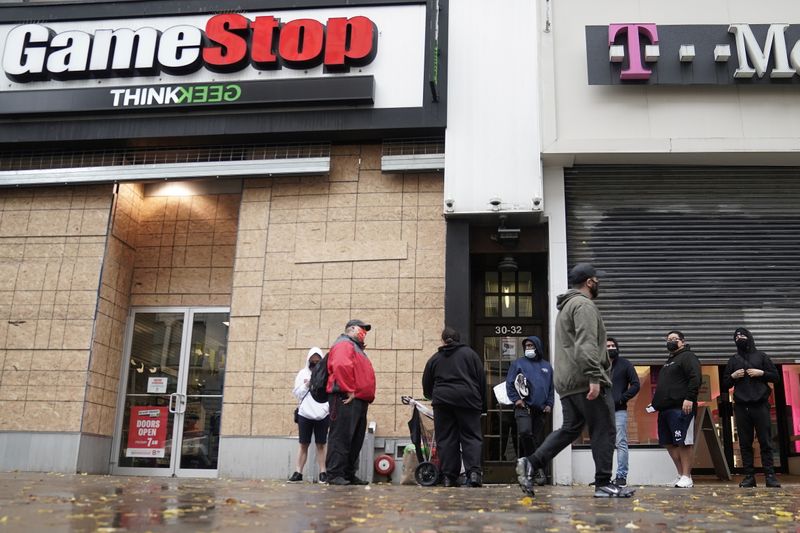© Reuters. FILE PHOTO: A screen displays the logo and trading information for GameStop on the floor of the New York Stock Exchange (NYSE) in New York City, U.S., March 29, 2022. REUTERS/Brendan McDermid
By Samrhitha A and Svea Herbst-Bayliss
(Reuters) – Ryan Cohen, the billionaire investor whose bold bet on GameStop Corp (NYSE:) made him a hero to meme stock traders, took over as executive chairman on Wednesday after the video game retailer ousted its CEO and posted a bigger-than expected quarterly loss.
Investors pushed the stock price down more than 20% in after-hours trading, continuing a roller-coaster ride that started in early 2021 when retail investors piled in to prove hedge funds betting on GameStop’s demise wrong.
Some analysts are questioning whether Cohen can turn GameStop around, two years after he became board chairman. The new executive function to his previous role gives him control over capital allocation, evaluating potential investments and acquisitions, and overseeing the managers of the company’s holdings, GameStop said in a regulatory filing.
CEO Matt Furlong’s firing came almost exactly two years after GameStop brought the former Amazon.com (NASDAQ:) executive back to the United States from Australia where he was working.
GameStop did not say why Furlong was terminated nor whether it planned to replace him, and did not respond to a Reuters request for comment. Cohen and his representative also did not respond to requests for comment.
In the regulatory filing, the company said Furlong was fired as CEO on Monday, the same day he resigned from the board. GameStop added that his board resignation “did not result from any disagreement with the company on any matter relating to the company’s operations, policies or practices.”
GameStop said in the filing that Furlong would receive any remaining payments and benefits he was entitled to under his CEO contract subject to him waiving any claims against the company in a “timely” fashion.
In an apparent word play, Cohen tweeted after the announcement of Furlong’s ousting on Wednesday “not for long.”
GameStop, which is valued at about $8 billion, agreed to make Cohen executive chairman on Wednesday and shrunk the size of its board from six directors to five, according to the filing.
Mark Robinson, GameStop’s top lawyer, was named as the company’s general manager, with his duties including “oversight of other executive officers besides the executive chairman.” He will report to Cohen.
Cohen, who made his fortune selling the online pet products retailer Chewy (NYSE:) for $3.5 billion in 2017, joined GameStop’s board in early 2021 and was elected chairman in June 2021.
With plans to remake the company into an e-commerce powerhouse, Cohen overhauled its top ranks by bringing in a string of executives from Amazon. But many of the hires, who were often drawn from Cohen’s personal network and vetted by him, have not lasted long.
Cohen has also backtracked on plans to build out e-commerce, relying more on GameStop’s brick-and-mortar stores and using them as places where customers can pick up online orders.
GameStop on Wednesday said net sales for the three months through April fell 10% to $1.24 billion, marking a fourth consecutive decline in quarterly revenue.
Since Furlong’s appointment was announced, GameStop shares have lost over half of their value and are down about 65% since June 2021. Cohen is the company’s largest investor.
Furlong is not the first GameStop top executive to leave after a short stint. Former chief operating officer Jenna Owens left in October 2021 just seven months after joining, and former financial chief Michael Recupero, who was hired at the same time as Furlong was brought in, was terminated last year.
The revolving door worried some analysts.
“It reflects the utter lack of strategy. They wanted to be like Amazon, and hired … from Amazon in 2021,” said Michael Pachter, analyst at Wedbush Securities.
GameStop said it will not hold a conference call to discuss the quarter.
MIXED SUCCESS
Ever since making his first investment in GameStop, Cohen has been fashioned into an activist investor, a reputation he expanded with bets last year on Bed Bath & Beyond (OTC:) and more recently on Alibaba (NYSE:) and Nordstrom (NYSE:).
At each company he pushed for changes with mixed success. Bed Bath & Beyond, where he quickly settled with the company for board seats last year, filed for bankruptcy earlier this year. At Nordstrom news of Cohen’s stake sent the share price higher, but he then quietly withdrew his nomination for two director candidates after pushing the company to replace the Nordstrom director who had previously been Bed Bath & Beyond’s CEO. Nordstrom’s stock price is down 29% in the last 52 weeks.
While Cohen arrived at GameStop after building Chewy into a powerhouse, industry analysts and some investors are now questioning his ability to revive other retail companies.
Wedbush’s Pachter said Cohen “is incapable of running a retail operation. … It’s sort of like Elon Musk running Twitter.”
At Bed Bath, Cohen sold his stake in August, just months after reaching the settlement in March, sending its stock price tumbling.
“While the ‘meme traders’ love Ryan Cohen, this is not ‘plan A’. This (GameStop) is a business in decline and a Hail Mary pass for investors to count on Cohen to turn it around,” said Thomas Hayes, chairman at Great Hill Capital LLC.
Read the full article here




